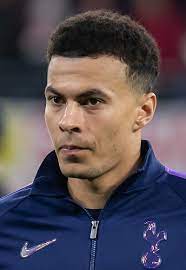By Samuel A. July 14, 2023
English midfielder Bamidele Alli was one of English soccer’s biggest prospects in the mid 2010s. He was a member of the England team that reached the World Cup semifinals in 2018, and that after a period when he was a star of Mauricio Pochettino’s young Tottenham side that nearly won the Premier League. However, the attacking midfielder’s career has dipped in recent years, from falling out of pecking order with Tottenham to not getting minutes in Everton and then being loaned to the Turkish league. Apparently, the midfielder was going through a lot of things that affected his mental stability, and he chose to share in an interview with former England defender Gary Neville, opening up on issues that have been affecting him.
The 27 year old revealed he had spent a period of this summer seeking rehab in the USA in a bid to come to terms with his struggles, which included an addiction to sleeping pills. The Everton midfielder gave poignant insight into the issues he was and is still fighting to overcome, describing how his addiction stemmed from attempts to deal with trauma suffered in his childhood.
Alli said in an episode of “The Overlap” released Thursday, was a reliance on sleeping pills which he said he was taking “just to escape from reality.”
“It’s been going on for a long time without me realizing it, the things I was doing to numb the feelings I had,” Alli said. “I didn’t realize I was doing it for that purpose, whether it be drinking or whatever. There are things a lot of people do but if you abuse it and use it in the wrong way, and you’re not actually doing it for the pleasure, you’re doing it to try and chase something or hide from something. It can obviously damage you a lot. I got addicted to sleeping tablets, and it’s probably a problem that not only I have. I think it’s something that’s going around more than people realize in football.”
“I was caught in a bad cycle. I was relying on things that were doing me harm,” he continued. “I was waking up every day and was winning the fight, going into training, smiling, showing that I was happy but inside I was definitely losing the battle, and it was time for me to change it.”
He continued : “I couldn’t have expected it to go the way it did. Before you hear about it, it has this whole stigma around it. It’s something people don’t want to do, go into rehab. It definitely sounds scary. I could never have imagined how much I would get from it and how much it would help me mentally, because I was in a bad place. A lot happened when I was younger that I could never understand.”
Alli, who is 27, thrived at Tottenham under Pochettino from 2015-19, saying the Argentine coach “cared about me as a person before the football,” but never had as good a relationship with other managers.
Alli said at the age of 24, when Jose Mourinho was Tottenham’s manager, he returned to a “bad place.” “One morning I woke up and I had to go to training, this is when he had stopped playing me. I was in a bad place and I remember just looking in the mirror, and was asking if I can retire now. At 24, doing the thing I love, for me that was heartbreaking.”
The former Spurs star also reflected on how to deal with criticism and praise for teammates, saying : “Sometimes, someone does a mistake in a game, if you get angry at them then usually they’ll make the same mistakes, but if you encourage them, then it’ll make them feel better and they’ll do better. If people start trying to do things all by themselves, it’s pretty much impossible. You have to rely on each other as well and you have to communicate and speak. But it’s important you speak in the right way. If you get angry and speak in a bad way, they’re not going to have a good reaction.”
In his conversation with Neville, Alli revealed how the viral clip of Jose Mourinho calling him ‘lazy’ was misdirected and that the coach later apologised.
Dele said he found it difficult to talk to his adopted family about the problems he faced, but hoped that by opening up now he could help others in similar situations. He said: “I think they had heard a few times about them but I would swear on everything that I had never taken them, that I was not taking them, which is part of the problem. I didn’t want help. I would tell myself I was not an addict, that I was not addicted to them. But I definitely was. I realised that. Going away and talking about it and understanding it more, I did need help and it got to the time where I did need help. I couldn’t do it by myself anymore. And I think that is the thing people need to understand. It is OK. We are definitely stronger, as humans we are stronger together, we don’t have to deal with everything alone. There is stuff you do deal with by yourself but if it’s having a negative impact on you and you feel like it’s OK, that it’s time, that you can’t do it by yourself any more, it doesn’t make you weak.”
In conclusion to his interview, the midfielder said he was at the “best place he has ever been” mentally. Harry Kane, England’s captain and a former teammate of Alli’s at Tottenham, tweeted that he was proud of Alli “for speaking out and sharing his experience to try and help others” while Everton said the club “respects and applauds Dele’s bravery to speak about the difficulties he has faced, as well as seek the help required”, as other players and football associations applauded his bravery.



